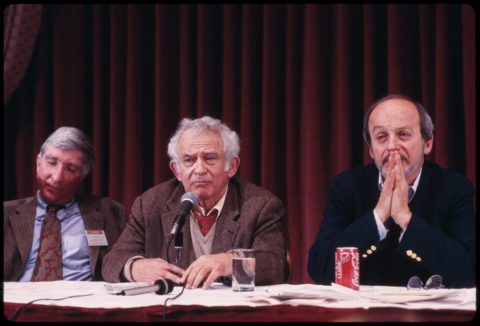Vancouver Maritime Museum
Published 21 Aug 2020in 1942, the St. Roch became the first vessel to complete the west-east traverse of the Northwest Passage. This documentary chronicles the historic journey. This film was prepared in 1942 for the R.C.M.P. by Cst. F.S. Farrar, first mate of St. Roch from 1930-34 and 1938-43.
January 11, 2022
Through the North-West Passage 1940-1942
Mailer, cancelled. Question mark?
In the most recent SHuSH newsletter, Ken Whyte outlines the “cancellation” of the late Norman Mailer by his Random Penguin editors … maybe … but probably not really:

American writers John Updike, Norman Mailer, and E. L. Doctorow at the PEN Congress, January 1986.
Photo by Bernard Gotfryd via Wikimedia Commons.
You have to feel for Norman Mailer, the late author of some forty books and a two-time winner of the Pulitzer Prize. There he lay, resting in well-deserved peace in the winter quiet of Provincetown Cemetery after a lifetime of fighting mankind’s greatest causes — civil rights, an end to war, the Great American Novel, his urgent libido — when out of nowhere comes a report that he has been canceled by his long-time publisher, Random House.
“With slow-mo hammer-dropping predictability,” wrote Michael Wolff in the newsletter, The Ankler, “Norman Mailer’s long-time publisher has recently informed the Mailer family that it has canceled plans to publish a collection of his political writings to mark the centennial of his birth in 2023, confirms the film producer Michael Mailer, the author’s oldest son.”
The reasons for the cancelation, according to Wolff, are “a junior staffer’s objection to the title of Mailer’s 1957 essay, ‘The White Negro’, a psycho-sexual-druggie precursor and model for much of the psycho-sexual-druggie literature that became popular in the 1960s. A Random House source also cites the objections of feminist and cultural gadfly Roxane Gay.”
Wolff’s scoop was promptly picked up and carried at face value all over North America, throughout Italy by La Repubblica, England by the Daily Mail, Chile by El Periodisto, and so on. It was the biggest cultural story going for several days, never mind that questions as to its veracity were raised almost the minute it broke.
Well, before it broke, in fact. Wolff himself scarcely seems convinced of his story. Yes, his headline is unequivocal: “Michael Wolff on Random House’s Cancelation of Norman Mailer”. But he admits in the newsletter that he couldn’t get anyone at Random House to confirm the news. Also that the Mailer estate didn’t actually have a contract for a book of political non-fiction with Random House for the publisher to cancel.
Wolff further allows that his one source at Random House steered him into a ditch, claiming that in addition to the anonymous junior staffer, Roxane Gay was involved. Wolff followed up with Gay, who told him she knew nothing of the controversy and had never read Mailer.
Camden Town Marmite Ale – Weird Stuff In A Can #156
Atomic Shrimp
Published 25 Sep 2021Beer, made with Marmite, which itself is made from the yeast left over when beer was made. Marmite is savoury; beer usually isn’t. This is a weird idea whichever way you look at it, but how does it taste?
From the comments:
Atomic Shrimp
8 hours ago
Afterthoughts & Addenda
uR pOuRiNg iT aLl wRoNg!!! – really? Fine – this might not be a professional perfect pour, but this is *not my first ever beer*. I don’t claim to have any kind of professional technique, but this amount of head is not normal for this method of pouring. Note the copious foam emitting from the can when it is first opened.
QotD: The decline of the “Blimp class” in the British empire
The stagnation of the Empire in the between-war years affected everyone in England, but it had an especially direct effect upon two important sub-sections of the middle class. One was the military and imperialist middle class, generally nicknamed the Blimps, and the other the left-wing intelligentsia. These two seemingly hostile types, symbolic opposites – the halfpay colonel with his bull neck and diminutive brain, like a dinosaur, the highbrow with his domed forehead and stalk-like neck – are mentally linked together and constantly interact upon one another; in any case they are born to a considerable extent into the same families.
Thirty years ago the Blimp class was already losing its vitality. The middle-class families celebrated by Kipling, the prolific lowbrow families whose sons officered the army and navy and swarmed over all the waste places of the earth from the Yukon to the Irrawaddy, were dwindling before 1914. The thing that had killed them was the telegraph. In a narrowing world, more and more governed from Whitehall, there was every year less room for individual initiative. Men like Clive, Nelson, Nicholson, Gordon would find no place for themselves in the modern British Empire. By 1920 nearly every inch of the colonial empire was in the grip of Whitehall. Well-meaning, over-civilized men, in dark suits and black felt hats, with neatly rolled umbrellas crooked over the left forearm, were imposing their constipated view of life on Malaya and Nigeria, Mombasa and Mandalay. The one-time empire builders were reduced to the status of clerks, buried deeper and deeper under mounds of paper and red tape. In the early ‘twenties one could see, all over the Empire, the older officials, who had known more spacious days, writhing impotently under the changes that were happening. From that time onwards it has been next door to impossible to induce young men of spirit to take any part in imperial administration. And what was true of the official world was true also of the commercial. The great monopoly companies swallowed up hosts of petty traders. Instead of going out to trade adventurously in the Indies one went to an office stool in Bombay or Singapore. And life in Bombay or Singapore was actually duller and safer than life in London. Imperialist sentiment remained strong in the middle class, chiefly owing to family tradition, but the job of administering the Empire had ceased to appeal. Few able men went east of Suez if there was any way of avoiding it.
George Orwell, “The Lion And The Unicorn: Socialism and the English Genius”, 1941-02-19.





